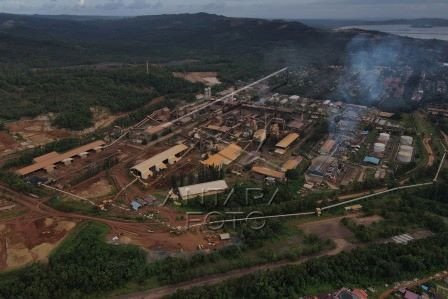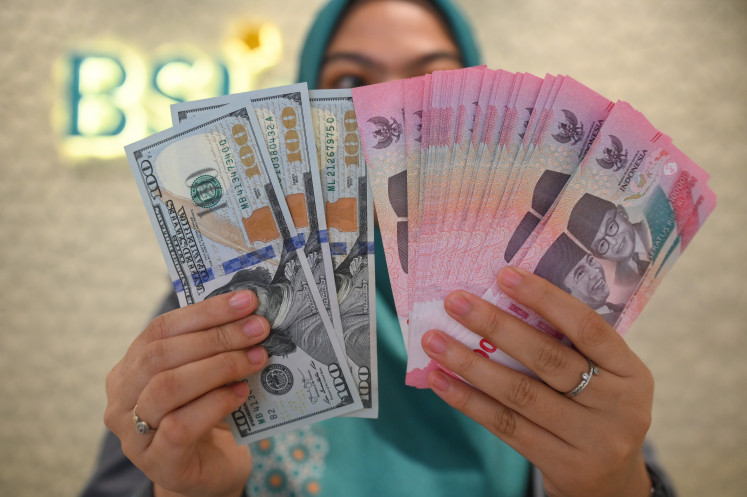Popular Reads
Top Results
Can't find what you're looking for?
View all search resultsPopular Reads
Top Results
Can't find what you're looking for?
View all search resultsWhy Indonesia should join the Minerals Security Partnership
The MSP will likely be the single largest opportunity in the coming years to establish significant economic linkages outside of China for Indonesia’s burgeoning nickel industry.
Change text size
Gift Premium Articles
to Anyone
T
he Minerals Security Partnership (MSP), which was launched by 14 countries and the European Union in Leuven, Belgium, last April, has established a financing network for critical mineral projects, and unfortunately Indonesia was not listed as a beneficiary.
This is only the beginning in what will likely be a multi-year long effort to break China’s dominance in critical mineral supply chains, with many other projects in the pipeline. For the partnership to achieve its aims, much more will be required.
Indonesia cannot afford to become sidelined from the critical mineral supply chains of tomorrow. So why has Indonesia missed out on the first round of financing in the new framework?
The country has not joined the MSP Forum, despite overtures by the United States. The forum is where non-member countries are invited to work together with MSP members in establishing responsible critical mineral supply chains that embed good governance, environmental stewardship and generate broad-based growth.
Many of the MSP members are also party to the Sustainable Critical Minerals Alliance, a grouping that seeks critical mineral supply chains that limit environmental damage, support local and indigenous communities, utilize ethical business practices and fight climate change.
The idea this is lip-service, “green protectionism” or favoring western allies doesn’t hold weight. Most recipient countries have demonstrated recent commitments to improving governance across environmental, economic and social metrics in recent years.
These same minimum standards are expected of both MSP members and MSP Forum members; establishing a baseline of governance across recipients of finance is necessary to build the desired supply chains.
Furthermore, the initial projects up for financing include Angola which has strong economic ties to Russia and China, and Kazakhstan which is politically and economically close with Russia.
MSP financing does not preclude countries that have engaged in forms of resource nationalism, like Indonesia, either. Tanzania and Angola have entrenched state interests present in the resources sector, while the former has flirted with export bans, the same as Indonesia, most recently for lithium.
Therefore, Indonesia’s hesitation in joining the MSP Forum is a troubling sign that the government is not ready to seize on the opportunity to diversify its critical mineral partners.
The MSP will likely be the single largest opportunity in the coming years to establish significant economic linkages outside of China for Indonesia’s burgeoning nickel industry. The cost will be improving Indonesia’s sustainability credentials, something that seems a small price to pay given the mixed impact of the industry so far.
Indonesia’s management of the critical mineral sectors has so far not been aligned with MSP objectives for sustainable supply chains. There are reports of lethal industrial accidents, worker safety violations and rampant pollution and environmental degradation in Indonesia’s nickel industry.
Negative impacts to local and indigenous populations are being increasingly recognized, and may have influenced two major European firms to withdraw from proposed nickel investments.
Further complicating matters, in order to process nickel into purified, high-quality inputs for batteries, Indonesia has rapidly increased coal power capacity to supply energy to the industry. The country now ranks as the sixth-largest carbon dioxide emitter and has unusually strong emissions growth compared with peer emitters.
The most recent blow was Indonesia’s nickel sector being included in a US Department of Labor report designating the industry as engaging in forced labor.
It is not all bad news, however. Indonesia is moving on this front. Government officials are conceding the need to lift sustainability standards in the industry and improve governance. Nickel producers are looking to certify their sustainability credentials to satisfy foreign buyers. There is also discussion of a nickel decarbonization road map due to be released in early 2025, although without international assistance, achieving this will be difficult.
Previous misalignment with the MSP sustainability and governance principles does not prevent joining the MSP Forum either. Tanzania had a big corruption scandal around mining exports some years ago, while Angola has seen its fair share of corruption scandals and a problematic environmental record in the resources sector. Therefore, Indonesia should prioritize joining the MPS Forum.
Financed projects aligned with the MSP include decarbonization and electrification of mining in Turkey and a low-carbon nickel processing project in Tanzania. There is clearly appetite for targeted financing to improve sustainability within critical mineral projects relevant to Indonesia. And this can be mobilized without Indonesia having to compromise its policies on nickel or who its economic partners are given the flexibility afforded other recipients.
The relationship between Indonesia and MSP members is highly variable. The European Union and Indonesia have clashed over Indonesia’s critical mineral export bans, although this dispute is cooling. Indonesia has been courting the US over a critical mineral trade agreement that would provide its nickel and electric vehicle (EV) batteries access to Inflation Reduction Act subsidies, although this has gone nowhere.
More positively, Australia and the United Kingdom have signed cooperation agreements with Indonesia to boost collaboration across the country’s critical mineral and EV industries. South Korea is also a major investor in both Indonesia’s nickel and EV industries.
It would be a mistake for the MSP members and Indonesia to allow a lack of coordinated engagement to continue. Indonesia should join the MSP Forum. The MSP members need to put up significant financing to encourage sustainable critical mineral supply chains developing in Indonesia.
For sustainable nickel to meet net-zero demands, Indonesia, the largest nickel producer in the world, must be included.
***
Robert Walker is a research associate at the Lowy Institute and works as an economist in the Institute’s Indo-Pacific Development Centre. Hilman Palaon is a research fellow at the Lowy Institute in the Indo-Pacific Development Centre. The views expressed are personal.










